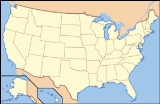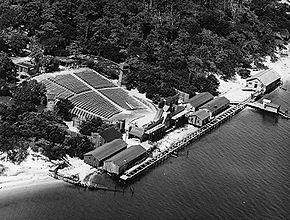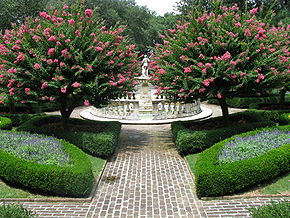
Fort Raleigh National Historic Site
Encyclopedia
!--replaced by NRHP box:Fort Raleigh National Historic Site preserves the location of Roanoke Colony
, the first English
settlement in the present-day United States. The site was preserved for its national significance in relation to the founding of the first English settlement in North America in 1587. The colony, which was promoted and backed by entrepreneurs led by Englishman Sir Walter Raleigh
, failed sometime between 1587 and 1590 when supply ships failed to arrive on time. When next visited, the settlement was abandoned with no survivors found. The fate of the "Lost Colony"
remains a mystery.
The historic site is off U.S. Highway 64 on the north end of Roanoke Island
, North Carolina
, about three miles (5 km) north of the town of Manteo
. The visitor center's museum contains exhibits about the history of the English
expeditions and colonies, the Roanoke Colony
, and the island's Civil War history and Freedmen's Colony (1863-1867).
More than a contraband
camp, which was started for slave refugees when the Union Army occupied the island in 1862, the Roanoke Island Freedmen's Colony was founded in 1863 to be self-sustaining. Its free residents were allocated plots of land by household, paid by the Army for work, and educated with the help of Northern teachers. By 1864 the colony had more than 2200 freedpeople as residents. It had a sawmill, fisheries and 600 cabins. More than 150 freedmen from the colony were among the nearly 4000 freedmen from North Carolina who served with the United States Colored Troops
. The colony is commemorated with a marble monument erected at the fort site in 2001 by Dare County.
The site is home to the outdoor symphonic drama Paul Green's The Lost Colony
, performed in the Waterside Theatre during the summer since 1937. It is presented by the Roanoke Island Historical Association.
 Fort Raleigh National Historic Site was established on April 5, 1941, through a transfer of property to the National Park Service
Fort Raleigh National Historic Site was established on April 5, 1941, through a transfer of property to the National Park Service
under a cooperative agreement with the Roanoke Island Historical Association (RIHA) and Acting Secretary of the Interior Alvin J. Wirtz, using authority provided under the Historic Sites Act
of 1935. As with all historic areas administered by the National Park Service
, the site was listed on the National Register of Historic Places
on October 15, 1966.
Fort Raleigh is co-managed with two other Outer Banks
parks, Wright Brothers National Memorial
and Cape Hatteras National Seashore
. It is the location of the group headquarters at the northern end of Roanoke Island. The cooperative agreement of 1941 allows RIHA to stage theatrical performances in the Waterside Theatre, also on park property. Paul Green's play, The Lost Colony, has been performed at this theater since 1937, with an interlude during World War II.
 Within the historic site are the Elizabethan Gardens, managed by the Garden Club of North Carolina, created as a memorial to the first colonists and as an example of a period garden. The gardens cover over 10 acres and include a replica Tudor gate house. There is a separate fee for the gardens.
Within the historic site are the Elizabethan Gardens, managed by the Garden Club of North Carolina, created as a memorial to the first colonists and as an example of a period garden. The gardens cover over 10 acres and include a replica Tudor gate house. There is a separate fee for the gardens.
Roanoke Colony
The Roanoke Colony on Roanoke Island in Dare County, present-day North Carolina, United States was a late 16th-century attempt to establish a permanent English settlement in what later became the Virginia Colony. The enterprise was financed and organized by Sir Walter Raleigh and carried out by...
, the first English
England
England is a country that is part of the United Kingdom. It shares land borders with Scotland to the north and Wales to the west; the Irish Sea is to the north west, the Celtic Sea to the south west, with the North Sea to the east and the English Channel to the south separating it from continental...
settlement in the present-day United States. The site was preserved for its national significance in relation to the founding of the first English settlement in North America in 1587. The colony, which was promoted and backed by entrepreneurs led by Englishman Sir Walter Raleigh
Walter Raleigh
Sir Walter Raleigh was an English aristocrat, writer, poet, soldier, courtier, spy, and explorer. He is also well known for popularising tobacco in England....
, failed sometime between 1587 and 1590 when supply ships failed to arrive on time. When next visited, the settlement was abandoned with no survivors found. The fate of the "Lost Colony"
Roanoke Colony
The Roanoke Colony on Roanoke Island in Dare County, present-day North Carolina, United States was a late 16th-century attempt to establish a permanent English settlement in what later became the Virginia Colony. The enterprise was financed and organized by Sir Walter Raleigh and carried out by...
remains a mystery.
The historic site is off U.S. Highway 64 on the north end of Roanoke Island
Roanoke Island
Roanoke Island is an island in Dare County near the coast of North Carolina, United States. It was named after the historical Roanoke Carolina Algonquian people who inhabited the area in the 16th century at the time of English exploration....
, North Carolina
North Carolina
North Carolina is a state located in the southeastern United States. The state borders South Carolina and Georgia to the south, Tennessee to the west and Virginia to the north. North Carolina contains 100 counties. Its capital is Raleigh, and its largest city is Charlotte...
, about three miles (5 km) north of the town of Manteo
Manteo, North Carolina
Manteo is a town in Dare County, North Carolina, United States, located on Roanoke Island. The population was 1,052 at the 2000 census. It is the county seat of Dare County.-Geography:...
. The visitor center's museum contains exhibits about the history of the English
England
England is a country that is part of the United Kingdom. It shares land borders with Scotland to the north and Wales to the west; the Irish Sea is to the north west, the Celtic Sea to the south west, with the North Sea to the east and the English Channel to the south separating it from continental...
expeditions and colonies, the Roanoke Colony
Roanoke Colony
The Roanoke Colony on Roanoke Island in Dare County, present-day North Carolina, United States was a late 16th-century attempt to establish a permanent English settlement in what later became the Virginia Colony. The enterprise was financed and organized by Sir Walter Raleigh and carried out by...
, and the island's Civil War history and Freedmen's Colony (1863-1867).
More than a contraband
Contraband
The word contraband, reported in English since 1529, from Medieval French contrebande "a smuggling," denotes any item which, relating to its nature, is illegal to be possessed or sold....
camp, which was started for slave refugees when the Union Army occupied the island in 1862, the Roanoke Island Freedmen's Colony was founded in 1863 to be self-sustaining. Its free residents were allocated plots of land by household, paid by the Army for work, and educated with the help of Northern teachers. By 1864 the colony had more than 2200 freedpeople as residents. It had a sawmill, fisheries and 600 cabins. More than 150 freedmen from the colony were among the nearly 4000 freedmen from North Carolina who served with the United States Colored Troops
United States Colored Troops
The United States Colored Troops were regiments of the United States Army during the American Civil War that were composed of African American soldiers. First recruited in 1863, by the end of the Civil War, the men of the 175 regiments of the USCT constituted approximately one-tenth of the Union...
. The colony is commemorated with a marble monument erected at the fort site in 2001 by Dare County.
The site is home to the outdoor symphonic drama Paul Green's The Lost Colony
Lost Colony (play)
The Lost Colony is a historical play by Pulitzer Prize-winning playwright Paul Green about Roanoke, the first English colony in North America. The play is based on the historical accounts of Sir Walter Raleigh's failed attempts to establish a permanent settlement in the 1580s in part of what was...
, performed in the Waterside Theatre during the summer since 1937. It is presented by the Roanoke Island Historical Association.
Administrative history

National Park Service
The National Park Service is the U.S. federal agency that manages all national parks, many national monuments, and other conservation and historical properties with various title designations...
under a cooperative agreement with the Roanoke Island Historical Association (RIHA) and Acting Secretary of the Interior Alvin J. Wirtz, using authority provided under the Historic Sites Act
Historic Sites Act
The Historic Sites Act of 1935 was enacted by the United States Congress largely to organize the myriad federally-own parks, monuments, and historic sites under the National Park Service and the United States Secretary of the Interior...
of 1935. As with all historic areas administered by the National Park Service
National Park Service
The National Park Service is the U.S. federal agency that manages all national parks, many national monuments, and other conservation and historical properties with various title designations...
, the site was listed on the National Register of Historic Places
National Register of Historic Places
The National Register of Historic Places is the United States government's official list of districts, sites, buildings, structures, and objects deemed worthy of preservation...
on October 15, 1966.
Fort Raleigh is co-managed with two other Outer Banks
Outer Banks
The Outer Banks is a 200-mile long string of narrow barrier islands off the coast of North Carolina, beginning in the southeastern corner of Virginia Beach on the east coast of the United States....
parks, Wright Brothers National Memorial
Wright Brothers National Memorial
Wright Brothers National Memorial, located in Kill Devil Hills, North Carolina, commemorates the first successful, sustained, powered flights in a heavier-than-air machine. From 1900 to 1903, Wilbur and Orville Wright came here from Dayton, Ohio, based on information from the U.S. Weather Bureau...
and Cape Hatteras National Seashore
Cape Hatteras National Seashore
Cape Hatteras National Seashore preserves the portion of the Outer Banks of North Carolina from Bodie Island to Ocracoke Island, stretching over . Included within this section of barrier islands along N.C...
. It is the location of the group headquarters at the northern end of Roanoke Island. The cooperative agreement of 1941 allows RIHA to stage theatrical performances in the Waterside Theatre, also on park property. Paul Green's play, The Lost Colony, has been performed at this theater since 1937, with an interlude during World War II.
Elizabethan Gardens

External links
- Official NPS site: Fort Raleigh National Historic Site
- Roanoke Island Historical Association: The Lost Colony drama
- North Carolina Gardens (site includes The Elizabethan Gardens)
- The Elizabethan Gardens

